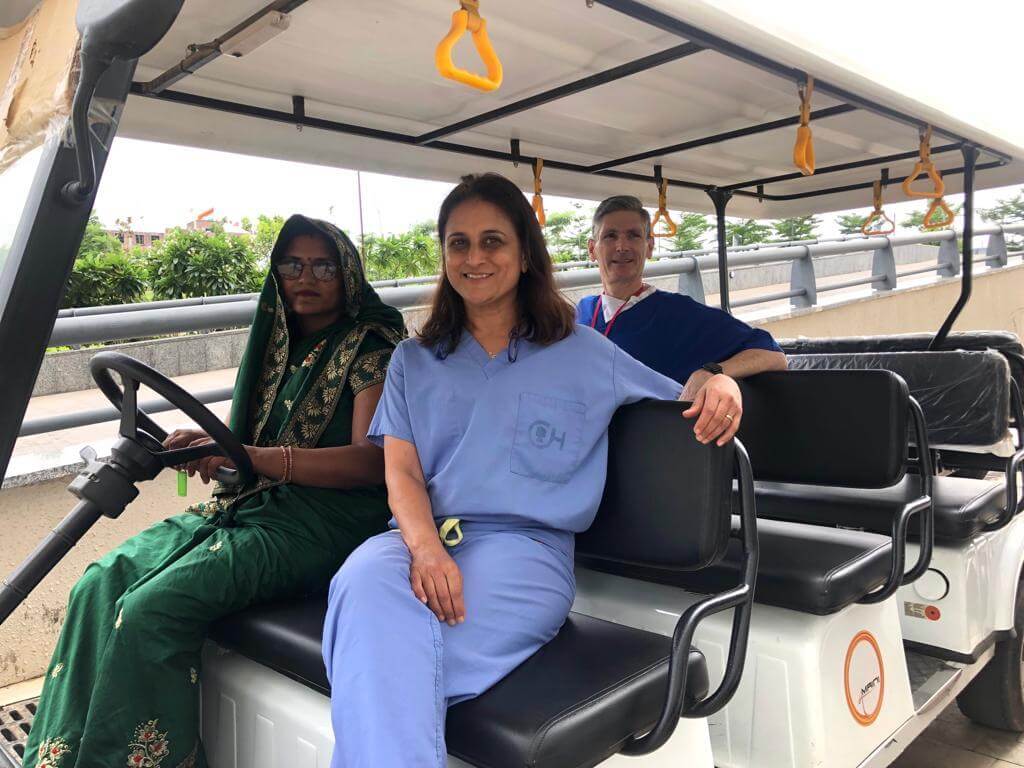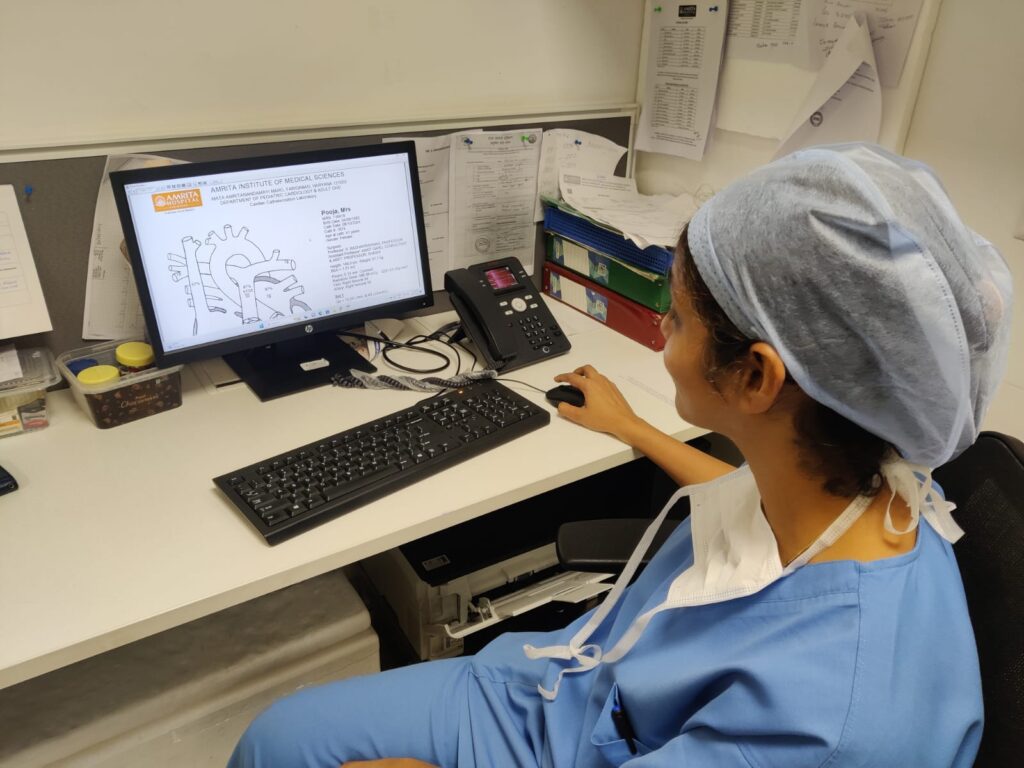October 15, 2024
From Philadelphia to Faridabad, This Hospital Partnership Is Transforming Heart Care for Children in India
Walking the halls of Children’s Hospital of Philadelphia (CHOP), Dr. Maully Shah carries out her impactful work with a strong sense of purpose. Dr. Shah is known not only for her medical expertise but also for her deep commitment to equity and global health. An attending pediatric cardiac electrophysiologist in CHOP’s Cardiac Center, she volunteers with her colleagues for the NGO Children’s HeartLink to address disparities in heart care availability and outcomes for children with congenital heart disease (CHD).
Through peer-to-peer trainings with the heart care team at Amrita Hospital Faridabad in India, they are setting a new standard for how compassionate, efficient heart care can be delivered to children in a resource-limited setting.
With two years of experience working in India following her pediatric cardiology fellowship, Dr. Shah is acutely aware of the access and affordability challenges facing low- and middle-income countries (LMICs) regarding heart care.
“The team at Amrita Faridabad is exceptional,” Dr. Shah said. “I am truly inspired by their ability to provide cutting-edge treatment with profound attention to cost and efficiency without compromising compassion and humility.”
The software donation that will transform heart care for children with congenital heart disease
Early in the partnership, the teams identified an urgent need to enhance tracking abilities of diagnostics for patients. Dr. Shah took it as the first challenge of this partnership, and spearheaded fundraising efforts to support a software donation which could very well change the course of thousands of children’s lives.
While in the United States, digital patient files are easily visible to healthcare providers that isn’t the case in India.
Mark Schwartz , cardiac center service line director at CHOP, was instrumental in executing this important donation. The software will become a central repository to digitally store measurements, images and other patient information, allowing the heart care team easier access to a child’s heart care journey.
“You want to know if a child has had heart surgery or an intervention, what that looked like so you can plan for future or immediate care,” said Veera Rajasekhar, Children’s HeartLink’s country director in India. “This software enables recording and storage of data related to pediatric catheterization procedures. With a built-in program patient specific anatomical diagrams are obtained, hemodynamic and patient statistical summaries are also compiled. This saves the physicians a lot of time which is better used for planning patient management.”
The team at Amrita Hospital Faridabad is excited to put the software into action and express their gratitude to CHOP and Children’s HeartLink for providing the software.
“This will significantly enhance our ability to deliver high-quality care in terms of data entry and retrieval for the future,” said Dr. S. Radhakrishnan, chief of pediatric cardiology at Amrita Hospital Faridabad. “We are eager to see the positive impact this software will have on our services and research.”
To Children’s HeartLink’s knowledge, this is the first time in India that the software is being used. The process improvements to patient follow-up, tracking and care, along with its potential for future research create space for Amrita Hospital Faridabad’s doctors to make more informed decisions and improve surgical outcomes, resulting in reduced mortality rates and improved quality of life for children with CHD.
“We ask our partner hospital teams and medical volunteers to work together to find the solutions that work in resource-limited settings,” said Jackie Boucher, president of Children’s HeartLink. “When a volunteer is passionate and advocates within their own institution on behalf of their peers, it’s amazing what can happen.”
The enduring benefits of this software donation will contribute to transforming pediatric cardiology in India, with more children with heart disease served and fewer children dying preventable deaths.
The global need for pediatric heart care
Congenital heart disease – the most common birth defect and the birth defect that causes the most infant deaths – affects 1 in every 100 births, or 1.35 million babies annually. Pediatric cardiac teams in LMICs, including the team at Amrita Hospital Faridabad, face many challenges that impede their ability to provide optimal heart care.
These challenges can range from limited specialized training to low availability of special medical equipment, supplies, infrastructure and funding. The hospitals often struggle to support a high volume of complex heart cases, leaving many children with congenital heart disease without the lifesaving care they need.
Each year in India, 60% of the approximately 240,000 children born with congenital heart disease require procedures to fix their hearts.
Despite the lifesaving potential of timely, high-quality heart care, 90% of affected children worldwide lack access, with the majority residing in LMICs.
“This is where Children’s HeartLink comes in,” Boucher said. “We create mentoring and training partnerships to improve existing pediatric cardiac programs. Instead of flying one child to receive heart care, we can improve the quality of care provided by the entire pediatric cardiac team in that child’s country. Essentially supporting hospitals in improving the quality of care they can provide and grow their heart care programs to further serve children born with congenital heart disease.”
The sustainability of improved care offered by long-term partnerships creates durable impact that includes education, infrastructure development and the strategic use of technology in the regions where it serves.
A blueprint for sustainable global health partnerships
The significance of this donation and the partnership model it stems from cannot be overstated. As the partnership between CHOP volunteers and the heart care team at Amrita Hospital Faridabad progresses, the successful integration of this software shows potential to be a promising model for other institutions and Children’s HeartLink partnerships in six countries, including Bangladesh, Brazil, China, India, Malaysia and Vietnam.
“Having been born and raised in India, the opportunity to give back to my home country is in itself a tremendous inspiration,” Dr. Shah shared about leveraging her personal success for broader humanitarian impact, an example of a global health initiative and how skilled diaspora members can raise healthcare standards in their home countries.
Her efforts showcase immense impact that individuals can have when they leverage their skills for global benefit.
Children’s HeartLink partnerships aim to save children’s lives by transforming pediatric heart care in underserved parts of the world. With a model that aims to eliminate health inequities worldwide, these efforts aim to build sustainability, provide lifesaving care and inspire the next generation of heart care providers to carry forward the torch of innovation and empathy.
About Children’s HeartLink
Children’s HeartLink saves children’s lives by transforming pediatric heart care in underserved parts of the world. The global nonprofit organization (NGO), partners medical volunteers from top teaching and research institutions with doctors, nurses and health care professionals in Bangladesh, Brazil, China, India, Malaysia and Vietnam to develop or improve pediatric cardiac care programs. Since 1969, the organization has reached more than 2 million children.
About Amrita Hospital Faridabad
Amrita Hospital Faridabad is an institution with a strong social commitment focused on health care, teaching and research. This private charitable hospital caters to both domestic and international patients. Their pediatric cardiology program provides a full spectrum of evaluation, diagnosis and management of congenital heart disease for infants, children and young people.
About Children’s Hospital of Philadelphia
The Division of Cardiology at Children’s Hospital of Philadelphia (CHOP) treats thousands of infants, children and young adults with heart conditions every year. Located in Pennsylvania, USA, CHOP is renowned for its excellent clinical outcomes, extensive international experience, committed leadership and status as a teaching hospital.


